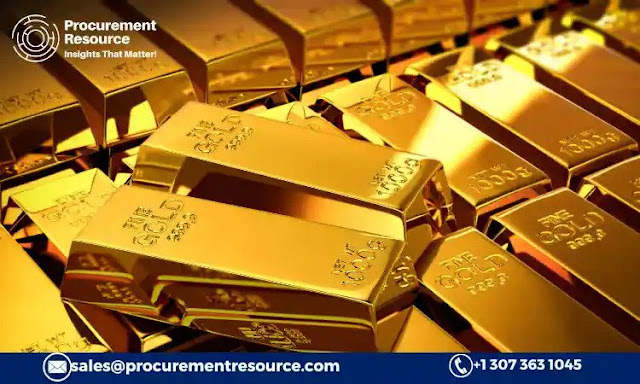Unraveling the Factors Influencing the Gold Price Trend: An In-Depth Analysis
- Get link
- X
- Other Apps
Get the latest insights on price movement and trend analysis of Gold in different regions across the world (Asia, Europe, North America, Latin America, and the Middle East & Africa). Gold, often termed the "safe haven" investment, has intrigued investors, economists, and enthusiasts for centuries. Its price movement not only reflects economic shifts but also geopolitical events. In this comprehensive guide, we'll delve into the definition of gold prices, key details impacting trends, the influence of industrial uses, key players in the market, and the intricate web of factors influencing gold prices across the globe.
Request for Real-Time Gold Prices: https://procurementresource.com/resource-center/gold-price-trends/pricerequest
Definition:
Gold price refers to the current market value of gold per ounce, which is determined by the forces of supply and demand. The price is subject to fluctuation based on various factors, including economic indicators, geopolitical events, market speculation, and the balance between production and consumption. It is often quoted in major currencies such as US dollars, Euros, and others, making it a significant commodity in the global market.
Key Details About the Gold Price Trend:
The gold price trend is a complex interplay of numerous elements. Gold's historical significance as a store of value and a hedge against inflation and economic uncertainty is one of the fundamental drivers of its trend. For instance, during times of economic instability or geopolitical tensions, investors flock to gold as a safe investment, increasing its demand and consequently its price. Moreover, the inverse relationship between the US dollar and gold prices is noteworthy. A weaker dollar often leads to higher gold prices, as it becomes cheaper for investors holding other currencies.
Industrial Uses Impacting the Gold Price Trend:
While gold is predominantly considered a precious metal for investment and jewelry, its role in various industries significantly impacts its price. The electronics sector heavily relies on gold due to its excellent conductivity and resistance to corrosion, used in electronic components like connectors and circuit boards. Additionally, the healthcare industry utilizes gold in medical devices and treatments, contributing to its demand and indirectly influencing its price.
Key Players:
Several key players shape the dynamics of the gold market. Institutions such as central banks and government reserves play a crucial role in determining the supply and demand equilibrium. Mining companies and refineries influence the market through production and distribution. Furthermore, investment and bullion banks, as well as individual investors, speculators, and jewelry manufacturers, contribute to the demand for gold, affecting its price trend.
Unraveling the Factors Influencing the Gold Price Trend:
Understanding the complexities behind gold's price movement requires dissecting numerous factors. Economic indicators like inflation rates, interest rates, and GDP growth significantly impact gold prices. In times of inflation or when interest rates are low, the opportunity cost of holding gold diminishes, driving up its demand. Moreover, geopolitical tensions, trade policies, and global crises such as pandemics or wars can create uncertainty, leading investors to seek the stability offered by gold.
The production and supply of gold also influence its price. Production costs, mining yields, and discoveries of new gold reserves affect the market supply, subsequently affecting the price. Additionally, investor sentiment and market speculation contribute to short-term fluctuations, leading to price volatility.
Forecasting the Future Trends:
Predicting the future trend of gold prices is challenging, given the multitude of influencing factors. Analysts and economists use various models and historical data to make projections. With the current economic landscape, ongoing geopolitical tensions, and the rise of digital currencies, forecasting gold prices becomes even more intricate. However, understanding the historical trends and the potential impact of future events can aid in making informed forecasts.
Conclusion:
Gold prices, driven by a myriad of economic, geopolitical, and industrial factors, continue to capture the attention of investors and analysts worldwide. Its historical significance and intrinsic value as a safe investment make it a crucial element in the global market. While forecasting gold prices remains uncertain, the in-depth analysis of key players, industrial uses, and influential factors provides a clearer understanding of the intricate trends shaping the golden metal's value. Staying informed and vigilant about these trends is essential for investors and enthusiasts navigating the ever-evolving landscape of gold prices across the world.
This blog post aims to offer comprehensive insights into the nuances behind gold prices, trends, and forecasts, allowing readers to grasp the complexities influencing this precious metal's market dynamics.
- Get link
- X
- Other Apps


Comments
Post a Comment